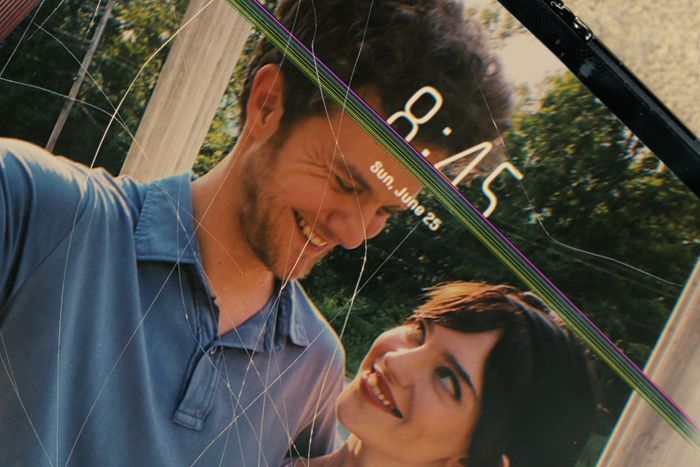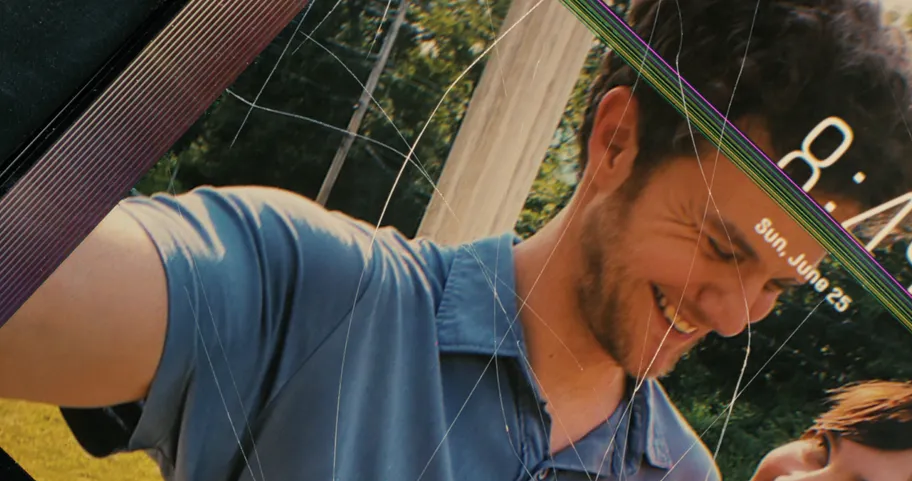
Sophie Thatcher and Jack Quaid star in a comedic thriller that’s better with dark twists than it is with big ideas. Photo: Warner Bros.
For maximum appreciation of its first act, Companion should ideally be gone into cold. But any attempt to preserve the sanctity of that experience also renders the movie impossible to write about, since what’s hidden behind that first big bend in the plot isn’t a twist so much as it is the premise — so consider yourself warned. Companion, a devious dark comedy from writer-director Drew Hancock, begins with an adorkable meet-cute at a grocery store. Iris (Sophie Thatcher) — a girl of the Zooey Deschanel school in her curtain bangs, headband, winged eyeliner, and retro frills — is shopping when she makes eye contact with Josh (Jack Quaid) in the produce department. He nervously knocks over a display of oranges, she starts laughing, and the next thing you know, they’re on their way to a weekend getaway at a lakeside cabin with two other couples. Iris is uncertain, worried about embarrassing Josh in front of his friends — especially Kat (Megan Suri), whose rich Russian boyfriend Sergey (Rupert Friend) owns the place, and who doesn’t bother to disguise her hostility. Eli (Harvey Guillén) and his boyfriend Patrick (Lukas Gage) are more welcoming, but Iris is obviously still on the social outskirts.
Maybe it’s that she’s the newcomer to an established friend group, or that she’s just more earnest and vulnerable than the others, open about the fact that her life revolves around Josh. Or maybe it’s that she’s not human. “I hate the term ‘fuck-bot,’” Josh confesses while revealing Iris’s true nature to her. Iris is, he explains, an “emotional support robot” (who also happens to fuck). She’s the product of a company called Empathix, whose companions are designed to be the perfect partners: customizable, devoted, possessed of just enough fake memories to feel real, and capable of being shut down with a voice command. Companion isn’t especially coy about Iris’s identity — that opening scene is obviously meant to evoke The Stepford Wives — but it’s cunning enough in its construction that the details of those opening sequences are a delight to revisit. Iris’s unbudgeable cat-eye in the shower isn’t actually movie magic, but part of her design, and the fact that she’s the one carrying their suitcases up from the car is indicative of her expected servitude. Her hopeless focus on Josh isn’t codependence, but programming. And all those times Josh tells her to wake up or go to sleep? They’re not the words of a loving boyfriend, but those of the owner of a device.
Companion, Hancock’s film debut after two decades in television, never replicates the brash high of that first reveal again, but it bounds ahead effectively, navigating a few more surprises and ramping up the violence as it goes along. In addition to the twice-adapted Ira Levin satire referenced in its earliest moments, Companion can be grouped in with Westworld and Ex Machina and the Terminator franchise, which becomes another explicit touchstone. But what it really brings to mind is The Menu, Mark Mylod’s dark comedy from two years ago, which is similarly limber, cynical, and efficiently conceived around a few limited locations. Like The Menu, Companion is only glancingly political, swapping out “eat-the-rich” sentiments for “hell-with-the-misogynists” ones without bothering to dig into the ideas it touches on. But it’s hard to bemoan a lack of depth when all the movie really wants to do is entertain. With its clever construction and comic timing, it’s a mean romp with an escalating death count and some nice quips. Thatcher, coming off an equally memorable turn in Heretic, is carving out a place for herself in what has become the extremely au courant genre that is the comedic thriller. Friend, Guillén, and an unusually strong Gage are all very fun.
Quaid, meanwhile, ably embodies a type of character who’s shaping up to be a recurring villain in 2025 — the savage softboy, who acts sensitive, and says all the right things, and turns out to be harboring all sorts of resentments ready to bubble over into acts of brutality. Companion is only nominally a sci-fi story, set in a near future where there are self-driving cars and everything otherwise mostly looks the same, and the ending, where it has to fill out more about the workings of its technology, is the weakest part. But at a time in which people are developing meaningful relationships with customizable chatbots, the movie’s correct in grokking that what’s intriguing about artificial intelligence so far aren’t the bigger philosophical questions about consciousness and personhood and ethics. No, what’s compelling is how we’re looking to this tech to address the absences in ourselves, and what it means to desire a partner who’s always available and interested without having any needs of their own. That kind of futuristic offering isn’t companionship so much as it’s a mirror, and the things it reflects aren’t going to be pretty — even if their makeup is never less than perfect.



